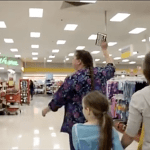North Carolina’s HB2 naturally falls heaviest on the transgender community. It also affects cisgender people who don’t conform to specific gender norms about appearance, especially women with short hair (see, for instance, this article about a short haired woman who was yelled at in a public restroom because she was taken for a transgender woman). One thing I haven’t seen much talked about, though, is HB2’s affect on parents. And no, I’m not talking about parents who are transgender or gender nonconforming, or parents of transgender or gender nonconforming children, I’m talking about every parent.
Almost a year ago I was sitting at a restaurant when my first grade daughter announced that she needed to use the bathroom. I sent her off on her own, as she knew her way, but a few minutes latter my three-year-old son announced that he, too, needed to use the bathroom, so I took his hand and off we went. I took him with me into the women’s bathroom and helped him sit on the toilet in a stall, as he was still going through this whole potty training thing. A man was doing the same at the next stall over, helping his young daughter, who looked to be about my son’s age. My daughter was in the stall on the other side of me, finishing up.
When my son was done, I helped him down from the toilet, helped him readjust his clothing, and took him to the sink to wash his hands next to his sister. As I turned the water on, the man finished washing his small daughter’s hands and turned to leave, and as he did so he apologized to me profusely. I was very confused. Why was this man apologizing to me? What was going on? I told him it was all fine—I was still confused, and just wanted him to stop repeatedly apologizing—and he ushered his daughter out.
And then it hit me. He was a man, in the women’s bathroom.
Up until the moment this man apologized, I literally had not realized anything was out of place. I was helping my son use the toilet, he was helping his daughter use the toilet—everything seemed to be in order! As I took the kids back to our table, I puzzled over this. The country was already starting to fall apart over whether trans women should be allowed to use women’s bathrooms, and yet and I hadn’t even noticed anything was amiss.
Why was this man in the women’s bathroom? In retrospect I suspect he sent his daughter into the women’s bathroom on her own and only belatedly realized that she wasn’t going to be able to manage it by herself. She probably called to him from inside the bathroom, while he was standing in the hall, and he went in to help her. I suspect nothing felt amiss because he was in there for the same reason I was—to help his kid pee. I got it. My kid was potty training too.
Fast forward a year, and I understand how that father felt more than ever. My son now prefers to use the men’s room when we’re out in public. I think it makes him feel like a big kid. It makes me, on the other hand, feel like a nervous mother sending her kid off to overnight summer camp for the first time. But it’s more than that—I can’t go in after him if he needs help. I mean technically I can, but it would mean going into the men’s bathroom, something that I am not supposed to do—something I could get in trouble for depending on an area’s increasingly detailed bathroom rules—something that feels increasingly risky in the high stakes bathroom atmosphere we now live in. I’ve stuck my head in if he’s taking too long.
Every parent or other caregiver who has ever had to retrieve an escaped toddler from the opposite-gender changing room at the gym understands these feelings. We’re used to making split-section decisions that turn on balancing the need to quickly retrieve our child with the embarrassment of violating the norms of social spaces. We’re less used to having to wonder whether we’re breaking the law or risking verbal or other harassment for doing so. That man helping his daughter in the bathroom at that restaurant last year could well be yelled at or have security called on him in today’s heightened climate.
HB2 includes this section of exceptions:
(d) Exceptions. � This section does not apply to persons entering a multiple occupancy bathroom or changing facility designated for use by the opposite sex:
(1) For custodial purposes.
(2) For maintenance or inspection purposes.
(3) To render medical assistance.
(4) To accompany a person needing assistance.
(4a) For a minor under the age of seven who accompanies a person caring for that minor.
(5) That has been temporarily designated for use by that person’s biological sex.“
Whether a parent going into the opposite sex public bathroom to help (or retrieve) a child violates HB2 appears to depend on how one interprets what is now Section 143-760(d)(4) of the state’s code. An individual is allowed to enter the opposite sex bathroom “to accompany a person needing assistance,” but the statute immediately specifies, under that point, that “a minor under the age of seven who accompanies a parent caring for that minor” may enter the opposite sex bathroom. In other words, it could possibly be argued that a child under the age of seven should, under the law, enter the opposite sex bathroom with their parent if they need assistance, rather than the other way around. If this is the case, what of parents like the father I encountered in the situation discussed above?
There’s also the question of what “needing assistance” means, of course. Are we talking about inability to reach the toilet paper—as I assume happened in the above mentioned case—or about accommodations for disabilities? And let’s talk about disabilities. What is the parent of an opposite sex seven-year-old severely disabled child? The law appears to allow, for instance, a mother to enter the men’s bathroom with her disabled son, but to forbid that same mother from taking her disabled son into the women’s bathroom.
That we are even having to ask these questions points to the extremely invasive nature of HB2. Parents should be allowed to meet their children’s needs with regards to using the bathroom while in public without having to wonder whether they’re breaking the law—and without having to risk being verbally or otherwise harassed. Every parent or caregiver knows that public bathrooms and young children—even older children—can be tricky. There’s the ten-year-old who is taking an extraordinarily long time in the bathroom, for instance. Is the opposite sex parent allowed to open the door, stick their head in, and visually and verbally check on the child?
The truth is that measures like HB2 affect everyone. They affect transgender people most significantly and with the greatest consequences, of course, but they also affect cisgender not following societal norms for gendered dress and appearance—and I have many cisgender female friends who have short hair or masculine dress styles who are increasingly nervous right now—and parents and caregivers simply trying to watch out for their children’s wellbeing while navigating the increasingly fraught terrain of public bathroom and changing room space.
There’s some irony, here. HB2 purports to be about protecting children, after all, but in practice it actually makes it harder for parents to care for their children.















